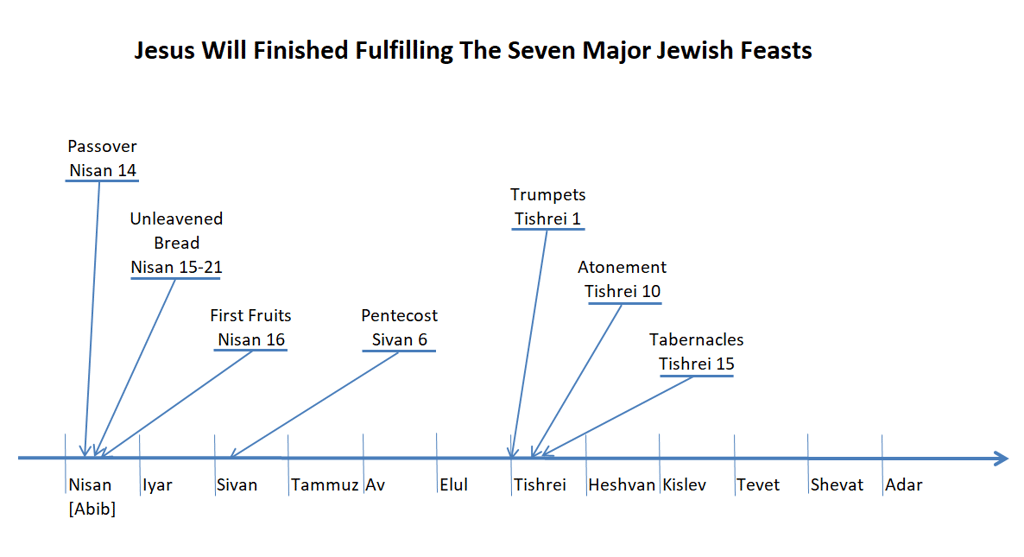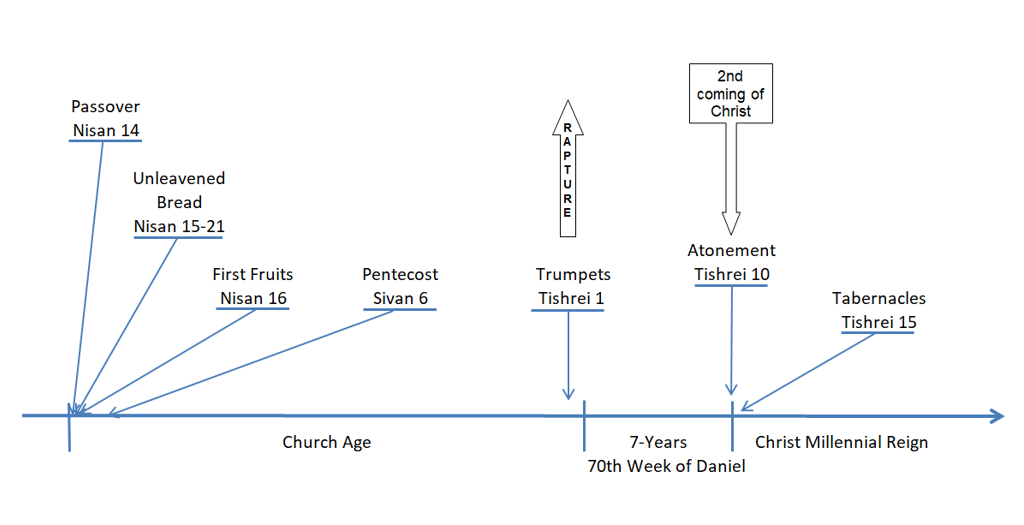Jesus Will Finished Fulfilling The Seven Major Jewish Feasts
Moses L H Tay
5/12/2024


The feasts are actually God’s feasts (Lev.23:2). The Jews are instructed to observe them but the feasts are all about Jesus Christ as they foreshadow His life and work. They are divinely designed to point to Jesus as the Jewish Messiah.
In AD 32-33 (Hebrew calendar year 3793), He started to fulfil them beginning with the first of the seven feasts – the Passover.
1) ● Passover (Pesach) — Leviticus 23:4-5
As Israel's deliverance from Egypt was accomplished through the blood of lambs, Jesus died and shed His blood as the Passover Lamb of God [1 Cor.5:7] to provide deliverance from eternal death.
2) ● Unleavened Bread (Chag Hamotzi) — Leviticus 23:6-8
Leaven represents sin, and eating unleavened bread symbolizes purity and the absence of sin. Jesus is the bread of life (Jn. 6:35) without sin, and His death and burial signifies the removal of sin.
3) ● First Fruits (Hag HaBikkurim) — Leviticus 23:10-14
This harvest feast celebrated the first fruits of the land. Jesus's resurrection on this day made Him the first fruits of those who would be resurrected (1 Cor.15:20).
4) ● Pentecost or Feast of Weeks (Shavuot) — Leviticus 23:15-21
This feast commemorates the giving of the Law at Mount Sinai. By sending the Holy Spirit at Pentecost (Acts 2), Jesus initiated a new covenant, birthing the Church and empowering believers to live by God's law.
Note:
Jesus already fulfilled the above 4 feasts.
The coming of the Holy Spirit on the Day of Pentecost marked the beginning of the Church Age. And the Church Age will come to a close when the Holy Spirit officially leaves the earth taking with Him the Church, the Bride of Christ in an event called the Rapture (1 Thes.4:15-17; 2 Thes.2:3-8).
The Rapture and the departure of the Holy Spirit will occur when the Last Trumpet is blown (1 Cor.15:52). It is believed that day will coincide with the Feast of Trumpets. Now, by making this statement, will this not contradict what Jesus said that no man knows the day or the hour of His coming (Matt.24:36)?
5) ● Feast of Trumpets (Yom Teru’ah) — Leviticus 23:24-25
In the Bible, the blowing of the trumpets could be for several purposes such as a call to worship, a signal of God’s presence, a warning of judgment, a declaration of victory, or a call to gather together. The Last Trumpet is a call to gather together, and if it coincides with the Feast of Trumpets, then, the Rapture should occur.
6) ● Day of Atonement (Yom Kippur) — Leviticus 23:27-32
After the Rapture, there is a period of 7 years known as the 70th Week of Daniel’s Prophecy. Refer to the article: Daniel’s 70 Weeks Prophecy [Determining the Appearance & Crucifixion of the Messiah at the 69th Week]. At the end of the 7 years, Jesus will return back to Jerusalem. At that time the Jews will believe He is their Messiah as the Spirit of grace will be poured out on them. Remember, the 70th Week is part and parcel of the 70 Weeks Prophecy that began under the Old Covenant.
Awaken to the reality that they had pierced the Lord on the cross of Calvary, the Jews will begin to mourn and to grieve for Him (Zech.12:10-14).
The Day of Atonement is to be observed with mourning and grieving. Anyone not afflicting his soul in this manner shall be removed from among the people (Lev.23:27-29). Just so, at that time 2/3 of the Jewish people who still refused to believe in Jesus as their Messiah will be removed. Only 1/3 among them will be kept alive to welcome their Messiah back to Jerusalem (Zech.13:8-9).
7) ● Feast of Tabernacles or Booths or Ingathering (Sukkot) — Leviticus 23:34-43
Israel experienced God’s presence and provision during their days in the wilderness dwelling in tents. Even so, during the 1000 years reign of Christ (Millennial Reign), God will dwell or “tabernacle” with His people (Rev.21:3).
Everyone alive at that time must go up to Jerusalem to worship the King, the Lord of hosts; and to keep the Feast of Tabernacles (Zech.14:16-19).
The reasons for keeping the Feast of Tabernacles are that the Millennium is still an age under the old creation, and the inhabitants of the earth are still sojourners until God eventually creates the new heaven and the new earth (Lev.23:42-43; Rev.21:1).


EndTimeScenario.com © 2025. All rights reserved.